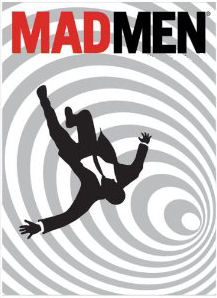(Continuing my look at the half-dozen or so tv shows I watch, and why I watch them.)
 Mad Men
Mad Men
Like Breaking Bad, I’d heard about Mad Men for a while before I watched it. It’s a great show about a Madison Avenue advertising company, people said.
I worked in advertising for about six years, as a temp and then full-time, mostly at a boutique agency in Pasadena. I was a proofreader and a copywriter. I grew to hate that job possibly more than any job I ever had, which is why I avoided Mad Men at first. The very thought made my stomach grumble.
But like any work of art of any depth, Mad Men isn’t really about its subject matter. It’s about advertising, all right, and the writers & researchers have definitely done their homework. I clearly remember some of the campaigns they reference (Heinz baked beans, Volkswagen, Right Guard, the Kodak Carousel). And the maneuvering to get and keep accounts (adjusted for dramatic inflation) feels pretty authentic.
The show’s production values also are terrific. Set dressing is practically a character all by itself. Again, the research here seems thorough, accurate, and authentic. The show conjures 1960 through the mid-60s almost eerily. I’ve gotten uncomfortable watching sometimes because the show’s often awkward and tense office parties so closely match my memories of my parents’ similar parties (my father was a VP at Eastern Air Lines & my mom was an executive secretary at EAL).
Period dramas often get the accessories right but the fundamentals wrong. Actors wear authentic clothes but just don’t act or talk the way people did; they’re still contemporary. Mad Men gets it right across the board.
And this gets me to what Mad Men is really about. I think it wants to show us how different the world was 50 years ago. How people treated themselves, women’s near-subjugation, men’s role-confinement, the way they looked at the future — these aren’t subtle differences, they’re profound. It’s a depiction of a generation. I’m looking at my parents here, but I’m not seeing them from outside. They aren’t old people with dated notions and unrelatable values. With Mad Men I’ve been moving along with them, feeling what they feel in all its glorious unexamined contradiction. In Mad Men, I am my parents. I’m shown who they were as people, in the context of their time, as a part of the expanding and ultimately diminishing wave front that is a generation. I’m seeing how the world got away from them, how my generation usurped them, how the next will usurp me.
I think that’s a brilliant accomplishment.
Mad Men accomplishes this through some amazing character development. The writing is great, but what makes it stand out is that it’s often opaque. Sometimes you aren’t sure why a character has done something. You get the feeling the character doesn’t know, either. Yet it fits. In a show about people who create images intended to manipulate, meaningful symbols abound. Yet, like advertising, they often exist iconically, without explanation and sometimes without context, yet never without meaning — even if the meaning isn’t readily apparent. I think that takes courage, and confidence, and trust.